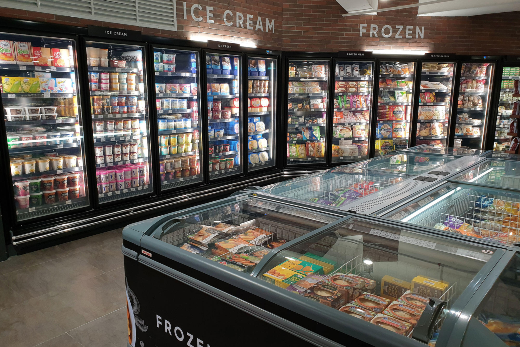Key Takeaways
- Europe Commercial Refrigeration Market forecast to grow from $12.63B in 2024 to $25.02B by 2033
- Regulatory pressure under EU’s F-gas phaseout is accelerating CO2-based refrigeration
- Germany leads market demand; Spain is fastest-growing
- Smart technologies like AI and IoT driving system efficiency
- Key players innovating in sustainable transport refrigeration and smart cold chain infrastructure
A regulatory reckoning is converging with surging e-commerce logistics to transform the Europe Commercial Refrigeration Market—long a steady utility—into a high-stakes industrial frontier.
Driven by the EU’s 2050 ban on fluorinated refrigerants and a rising tide of online food retail, the continent’s cold chain infrastructure is expanding at speed. Analysts forecast the Europe Commercial Refrigeration Market will reach $25.02 billion by 2033, nearly doubling from $12.63 billion in 2024, according to Custom Market Insights.
The key inflection: natural refrigerants such as CO₂, now mandated across new installations, are upending both product development and capital planning. What was once backroom hardware has moved to the center of Europe’s green transition—and its supply chain resilience.
From Kitchen to Logistics Hub
Demand in the Europe Commercial Refrigeration Market is no longer confined to restaurants and supermarkets. Today’s cold chain stretches from cloud kitchens and urban warehouses to mobile cooling units on delivery fleets. This shift—accelerated by consumer expectations for freshness and speed—is reshaping equipment requirements.
Germany leads the Europe Commercial Refrigeration Market, bolstered by its industrial base and early compliance with climate directives. Spain, meanwhile, is the fastest-growing regional market, projected to reach $1.31 billion by 2030.
“Commercial refrigeration is now integral to how Europe feeds itself—and how it meets its climate goals,” said Dr. Helena Meier, energy policy analyst at the German Institute for Climate and Energy.
Policy as Market Engine
The European Union’s updated F-gas Regulation, which mandates a full phaseout of fluorinated gases by 2050, is acting as both stick and catalyst for the Europe Commercial Refrigeration Market. Under the revised framework, natural refrigerants are no longer optional—they’re the regulatory baseline.
This has sparked a flurry of innovation. Mitsubishi launched electric-driven transport units for mid-size trucks in June. Embraco debuted R290 condensing units tailored to undercounter and blast chilling applications. Bitzer renewed its partnership with Beijer Ref to accelerate CO₂ system deployment.
“Regulation is forcing the hand of legacy players,” said Anders Vanhoutte, a refrigeration analyst at GreenLoop in Copenhagen. “And it’s creating room for smaller, agile manufacturers.”
Smart Systems, Fragmented Field
IoT and AI are redefining the Europe Commercial Refrigeration Market as a data-driven utility. Predictive diagnostics, energy optimization, and remote monitoring are fast becoming standard in new builds. Dual-zone systems—capable of managing varied temperatures simultaneously—now dominate commercial kitchens and logistics centers alike.
Still, the Europe Commercial Refrigeration Market remains fragmented. Global firms such as Daikin, Haier, and Johnson Controls compete alongside regional specialists. Whirlpool’s European unit merged with Arçelik, while Asian brands are expanding smart-home tech into commercial applications.
“Consolidation is coming,” said Clara Ruiz, product lead at Barcelona’s Frigotec. “But right now, it’s a patchwork of innovation and legacy systems.”
Refrigeration as Strategic Asset
What was once considered background equipment now factors into ESG scoring, operational continuity, and carbon disclosure reporting. For food delivery startups and supermarket chains alike, refrigeration has become a strategic differentiator.
“The winners won’t just sell equipment—they’ll build climate-proof, logistics-ready ecosystems,” said Meier.
As Europe’s energy grid decarbonizes and food systems digitize, the Europe Commercial Refrigeration Market is no longer a static line item. It is, increasingly, the infrastructure of the future.



